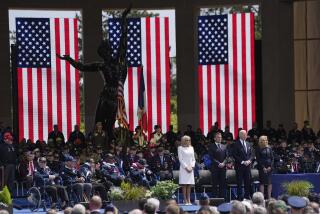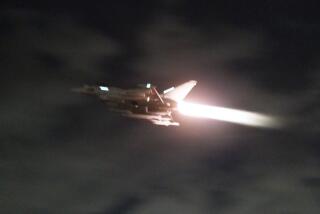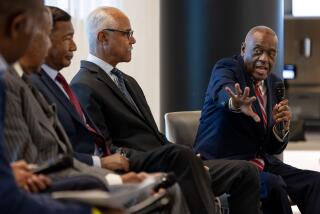Mood of Troops Turns Grim in Gulf War Talk
- Share via
SAUDI ARABIA — A grim new mood swept across this kingdom’s eastern desert Saturday as echoes of resurgent war talk reached U.S. encampments and soldiers came to grips with the realization that their fates are now tied firmly to the outcome of the Persian Gulf crisis.
With massive American reinforcements on the way and planned troop rotations postponed indefinitely, top commanders cast ambiguity aside and, on the 215th birthday of the Marine Corps, spoke bluntly about a possible U.S.-led attack against Iraq.
The sobering words about new offensive options and warnings of an uncertain future had the sound of a call to arms in the starkly martial celebrations held at dusty desert compounds where thousands of Marines are encamped.
“More than ever before,” warned Maj. Gen. Robert M. Johnston, chief of staff for the U.S. Central Command, as assembled troops stood at rapt attention, “the prospect of offensive combat is going to be the greatest challenge that Marines have seen in many decades.”
“Strong signals are being sent,” said Brig. Gen. Thomas B. Draude, assistant commander of Marine ground forces here, adding, in obvious understatement: “Things are a little different than they were a week or so ago.”
The two commanders addressed the troops as word began to circulate that President Bush had authorized the deployment of more than 200,000 U.S. military personnel over the next two months or so to join the 238,000 already assigned to the Persian Gulf area.
Among the Marines here, scattered disclosures of the new developments generated less outright complaining than stoic reflection about the implications of being deployed for the duration when the prospect of war seems to be increasing.
Shown a copy of a newspaper story about the canceled rotations, 19-year-old Lance Cpl. Brad Olmstead of Spokane, Wash., sat purse-lipped for a moment in the back of a bouncing, five-ton truck.
Then, he slung his arm around the shoulder of 23-year-old Lance Cpl. Richard Dobbs, a fellow sentry from the headquarters of the Camp Pendleton-based 1st Marine Division. “Buddy,” he said, “we’re here to stay.”
Members of a congressional delegation who met with troops in Saudi Arabia on Saturday told reporters afterward that an Iraqi withdrawal from Kuwait would no longer be considered sufficient to end the gulf standoff.
Reps. John P. Murtha (D-Pa.) and Stephen J. Solarz (D-N.Y.) said many members of Congress are now convinced that Iraqi President Saddam Hussein’s arsenal of chemical weapons and potential capability to produce nuclear arms must be eliminated as part of any resolution.
“If he moves out of Kuwait unilaterally, we are also going to insist, the Congress will insist, that he not have this ability and that we be able to verify it,” said Murtha, chairman of the House Defense Committee.
The expanded U.S. deployment, which includes hundreds of tanks and three aircraft carrier groups, will provide the additional force that commanders have said they would need to launch a possible military offensive to drive Hussein’s forces out of Kuwait.
As part of the massive buildup, Defense Secretary Dick Cheney has said that previous plans to begin rotating troops out of the gulf will be put off indefinitely so that the U.S. force can be increased to peak levels.
In helicopter shuttles to half a dozen Marine units Saturday, it was evident that few troops had more than sketchy information about either the magnitude of the planned reinforcements or the cancellation of troop rotations.
Acknowledging that such details were bound to have an even further “sobering effect,” Brig. Gen. Mike Myatt, commander of Marine ground forces, said he planned to brief field commanders today on the news that their troops will be kept in place indefinitely.
“It’ll be tough on the Marines,” predicted Col. John. H. Admire, the commanding officer of the 3rd Marine Regiment, who said his troops had been counting on rotation after six to eight months of service.
Some Marines, told of the no-rotation policy, responded with stares of disbelief, reflecting the degree to which many had begun to look forward to some springtime relief.
Others, who gathered in small clusters to learn more news from reporters after the ceremonial cutting of Marine Corps cake, complained of more children’s birthdays missed, anniversaries celebrated by long-distance, even discharges delayed.
But from combat troops who for months have urged that they be permitted to “get it over with and get out,” the news also prompted hope that the abandonment of rotations means that the United States is not prepared to wait forever.
“If they say we’re going to be here till it’s over, that means something’s going to be happening pretty soon,” said Sgt. Perry Cooke, of Brooklyn, N.Y., whose enlistment was due to run out next month.
Even largely cut off from the news, however, Marines said that in recent days they had begun to sense, as one lance corporal put it, “that things were beginning to go down.”
At the same time, some officers said, the extraordinary bluntness of the remarks from Johnston, the top deputy to Gen. H. Norman Schwarzkopf, the theater commander in chief, appear to leave little doubt that something significant has changed.
Lt. Gen. Gary Luck, commander of the Army’s 18th Airborne Corps, used similarly strong language in a separate appearance, scorning Iraq’s refusal to back down in the face of superior U.S. force.
“(Saddam) Hussein is the one who should be uncomfortable,” Luck said. “Either his ego is too big or he’s dumber than a stump not to understand his situation.”
Until last week, military officials stuck closely to ground rules permitting discussion only of defensive scenarios, noting that the declared mission of the United States remained the defense of Saudi Arabia.
But now that the President himself has lifted the barrier to discussion of offensive operations, Johnston said in an interview that ground training for U.S. forces could receive new emphasis on attack-oriented tasks.
And in contrast to the ambiguities in which top American generals tended in the past to talk about a U.S. offensive, the two-star general painted a vivid picture of a war that could lie ahead.
“We may indeed have to concern ourselves with an offensive option,” Johnston said. “We’ve got to make sure that if that decision is made and we go into combat, that once again we are able to measure up to the great expectations that people have for the Corps.”
Johnston said he and other Marines who fought in Vietnam “can say with confidence that we know how we’ll respond under fire.” But, he added, “I can tell you that this is going to be a completely different battlefield.
“In Vietnam, we didn’t exactly face 5,000 tanks,” the general said, observing also that Iraq has access to advanced technologies. “It’s going to be a new ballgame. . . . It’s going to require boldness and daring and initiative and speed.”
The celebration of the Marine birthday included the presentation of cakes adorned with reminders of past Marine battles, notably the World War II clashes in the Pacific at Wake Island, Tarawa and Iwo Jima.
In their remarks, the generals urged Marines to remember the standard that their predecessors had set and to regard themselves as privileged to open a new chapter in a record that the division chaplain described as “from the halls of Montezuma to the sands of Saudi Arabia.”
“Like tens of thousands of other Marines,” said Lt. Gen. Walter E. Boomer, commander of all Marine forces here, in a further evocation of the tough-talking new message, “you celebrate your birthday preparing for battle.”
More to Read
Sign up for Essential California
The most important California stories and recommendations in your inbox every morning.
You may occasionally receive promotional content from the Los Angeles Times.













